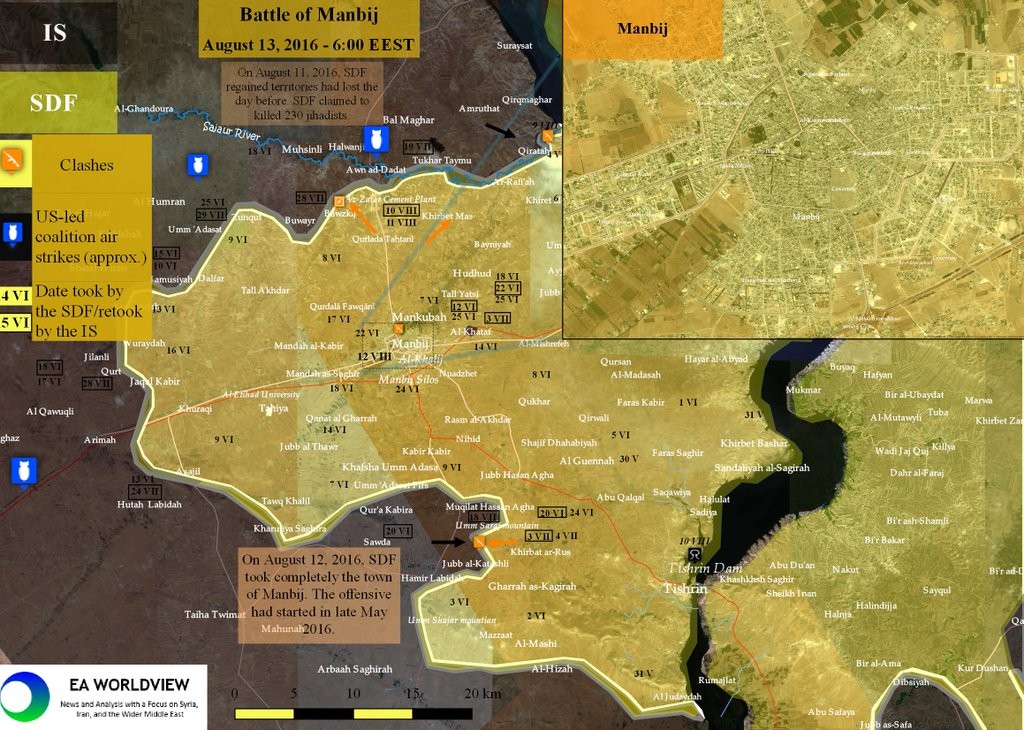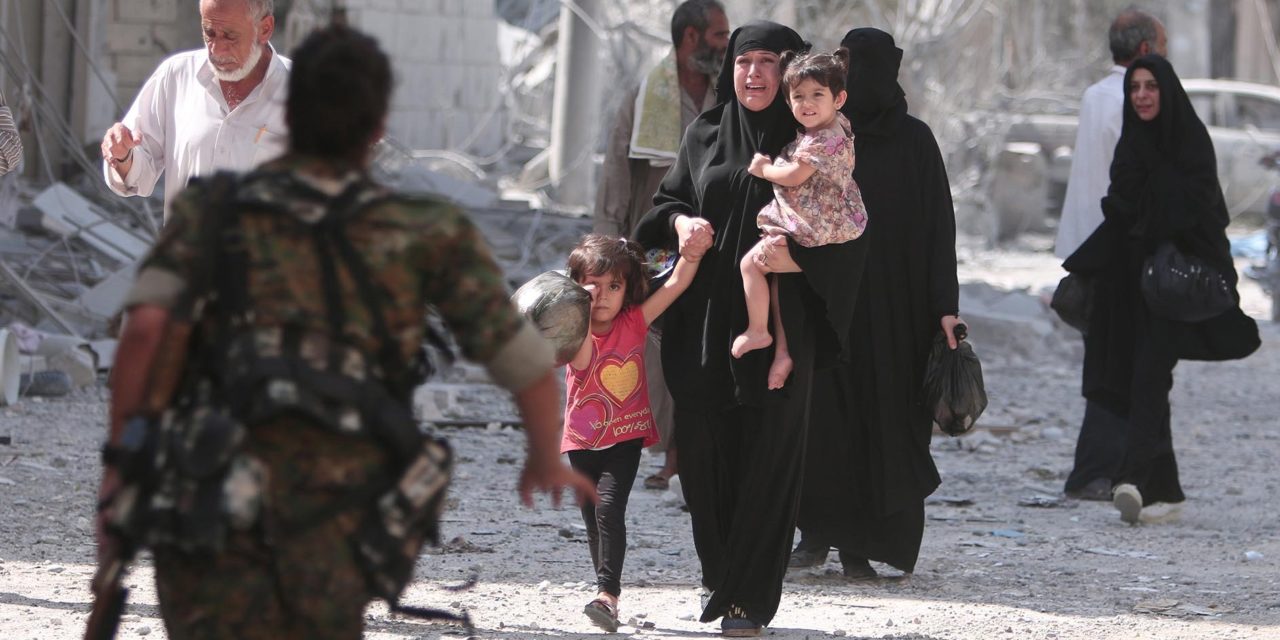PHOTO: Syrian Democratic Forces fighter assists civilians after the capture of Manbij in Aleppo Province on Friday (Rodi Said/Reuters)
LATEST
- Head of Kurdish National Council Arrested by Kurdish Security Forces
- “Assad Regime Increasingly Confident It Can Attack With Chemical Weapons Without Reprisal”
- Ahrar al-Sham on “Positive Step” of Jabhat al-Nusra
- Bombing on East Aleppo, Shortages in the West
- LCC: 97 Killed Across Country on Friday
After a 2 1/2-month offensive, the Kurdish-led Syrian Democratic Forces have taken the city of Manbij, the Islamic State’s main position in Aleppo Province.
The SDF was sweeping the city on Friday after the departure of the last ISIS fighters, said Sharfan Darwish of the SDF-allied Manbij Military Council.
Kurdish outlets had said earlier in the day that 2,000 residents were seized by the Islamic State as they withdrew, but Darwish said the civilians were freed by the SDF.
He added that sleeper cells in the city were still a threat.
The SDF was created last October with support from US airpower, weapons, supplies, and special forces. It is led by the Kurdish militia YPG and largely made up of Kurdish fighters, although there are Arab and Assyrian units.
Through the winter and spring, the force advanced against ISIS in northeastern Syria. By December, it had moved west across the Euphrates River, despite a Turkish “red line”.
After negotiations between the US and Turkey to ease Ankara’s objections, the Manbij offensive began at the end of month. It soon surrounded the city, but was held up on the outskirts because of fears for 50,000 civilians, according to the SDF and US military.
Attacks continued around the city and the SDF began moving into districts last month. Intense US airstrikes supported the advance, reportedly also killing scores and possibly hundreds of residents.
On Friday, a convoy of about 500 ISIS vehicles reportedly carried the final fighters from Manbij, retreating to Jarablus on the Turkish border. Kurdish sources said — in contrast to the claims that the Islamic State had seized 2,000 “human shields” — that the withdrawal was agreed between ISIS and the SDF, although it would not be announced officially.
Map by Artur Rosinski of NewsMap:

Head of Kurdish National Council Arrested by Kurdish Security Forces
The head of the Kurdish National Council has been arrested by Kurdish security forces.
Ibrahim Biro was detained on Saturday in Qamishli in northeastern Syria.
A member of the Kurdish Union Party, Dilshad Gado, said, “Asayish forces in Qamishli arrested Ibrahim Biro, head of the ENKS [Kurdish National Council] and another leader from the Kurdish Union Party named Sleman Auso at the city’s bazaar without any justification and they were taken to an unknown place.”
Meanwhile, supporters of the ruling Democratic Union Party (PYD) in Qamishli have taken down the Kurdish flag from the office of the Kurdish Union Party on the southern side of the city, according to the Kurdish outlet Rudaw.
The PYD has become the dominant faction in the Syrian Kurdish movement, overtaking even the umbrella Kurdish National Council, because of its YPG militia which leads the Kurdish military effort in Syria.
In a July 17 interview with Rudaw, Biro said that his life was in danger and that he had been threatened with arrest several times by the PYD if he returned to the city:
In the near future, I will return to Rojava [Syrian Kurdistan] from the [Iraqi] Kurdistan Region. They [authorities] tell me that I should not return to Rojava, otherwise I will be arrested. But I do not care what they say and I return.
“Assad Regime Increasingly Confident It Can Attack With Chemical Weapons Without Reprisal”
The Guardian of London writes in an editorial following the latest chemical attacks by regime helicopters in northwest Syria:
As one doctor in Aleppo observed bitterly, using chemical agents without accountability is the new normal in Syria.
Ever since the crossing of President Obama’s red line by the sarin attack in Damascus three years ago, the Assad regime has appeared increasingly confident that it can attack with chemical weapons without fear of reprisal. The UN’s monitors are due to report by November. But the taboo has already been broken, and many hundreds of people are likely to suffer the consequences of this new failure by the international community.
See Syria Daily, August 11: Reports of Another Regime Chlorine Attack
The site Bellingcat has published a lengthy review of the open source material documenting Wednesday’s chlorine attack on an opposition-held district of Aleppo city, killing at least four people and injuring up to 75.
Ahrar al-Sham on “Positive Step” of Jabhat al-Nusra
The leading rebel faction Ahrar al-Sham has said that Jabhat al-Nusra’s formal break from Al Qa’eda is a “positive step in the right direction”, but has called on the jihadists to do more to establish that the detachment is not a token measure.
In a lengthy interview with the al-Hayat newspaper, Ahrar al-Sham spokesman Labib al-Nahhas said the announcement by Jabhat al-Nusra — now renamed Jabhat Fatah al-Sham — was belated and had been “something demanded by the various components of the Syrian revolution on the military and political levels for a long time”.
Nahhas added that the inclusion of JFS “into the national revolutionary project must be a priority for everyone”. However, the jihadists must explain their political position as a “distinct step” away from Al Qa’eda and for the Syrian movement against the Assad regime.
See also Syria Analysis: The Dangerous Misunderstanding of “Al Qa’eda”
Bombing on East Aleppo, Shortages in the West
Inside a New York Times summary of the protracted war for Aleppo city is this extract pointing not only to the Russian-regime attacks on the opposition-held east but also shortages and concerns in the regime-held west:
“Every day we have wounded, every day we have sick people,” Abdulqader Habak, an activist in the city’s rebel-held eastern part, said via Skype. He and other activists have also reported an increase in attacks using chemical gases, increasing civilian misery.
Life is slightly better in the western part of the city, where the government of President Bashar al-Assad maintains control and there are no airstrikes. But food stocks there have dwindled, some areas are without water and electricity, and many fear that the ability of Mr. Assad’s forces to protect them is slipping.
“Today, I went around for one hour looking for chicken and I couldn’t find any,” said Safwan, a merchant in western Aleppo who gave only his first name for fear of retribution for speaking to foreign news media. He said there were long lines at gas stations, bare shelves at fruit and vegetable stores, and hospitals overloaded with wounded soldiers, militiamen and civilians.
LCC: 97 Killed Across Country on Friday
The Local Coordination Committees have documented the deaths of 97 people, including 13 children and 10 women, across Syria on Friday.
In Aleppo Province, 39 people were killed amid Russian-regime airstrikes on the town of Hayyan. In Idlib Province, there were 37 deaths as the town of Harbanoush and Aliya were bombed.

